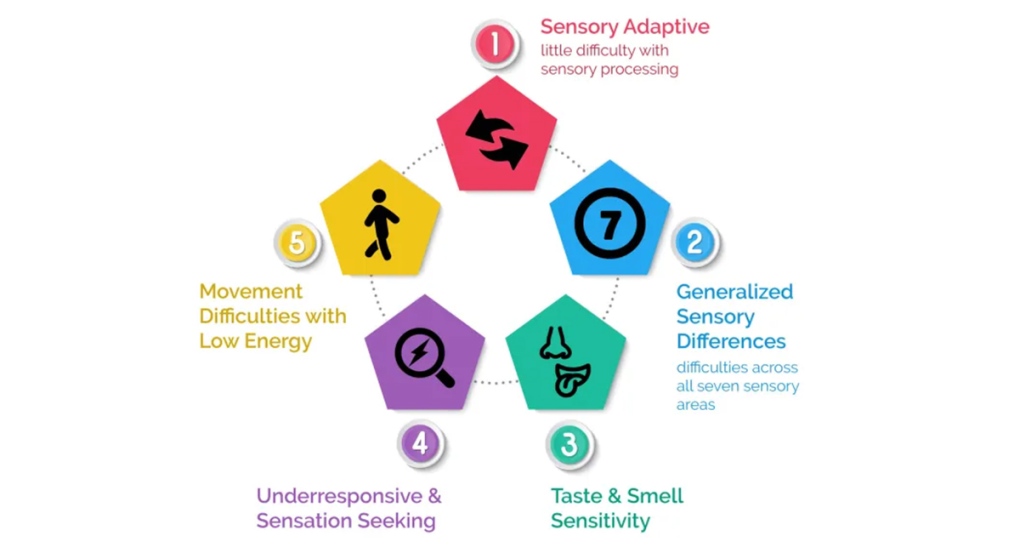New study clarifies sensory processing in kids with autism
 Sensory processing patterns in autism spectrum disorder. (Source: BrainsCAN)
Sensory processing patterns in autism spectrum disorder. (Source: BrainsCAN)
A new study involving researchers at Western University in London, Ont. that looked at sensory abilities in children with autism points to a need for more tailored environments.
The study looked at whether reactions to sensory information, which can be a challenge for those with autism, tended to occur together.
Nichole Scheerer, a postdoctoral fellow at Wester BrainsCAN and first author of the study, said in a statement they were looking for patterns of co-occurrence.
“If someone tends to be more sensitive to sound, are they also going to be more sensitive to light? If someone is sensitive to textures and tactile stimulation (things like pain and temperature), are they also sensitive to tastes, but not sensitive to light?”
Researchers were able to identify five categories of sensory processing in autism:
- taste and smell sensitivity
- under responsive and sensation seeking
- movement difficulties with low energy
- little difficulty in sensory processing
- difficulties in all areas of sensory processing.
These categories were then linked to common behavioural traits including; socialization difficulties, communication issues, repetition or compulsions, and clinical traits found in attention deficit hyperactivity disorder and obsessive-compulsive disorder.
Western Psychology Professor Ryan Stevenson, senior author of the study explained, “Children with different sensory processing patterns also showed differences in adaptive behaviours and daily living skills. This shows that sensory differences can have a big impact on the day-to-day experiences of autistic children.”
There is hope that better understanding the sensory categories will lead to a more tailored approach to supportive environments that can help accommodate them.
“An autistic child might perform poorly in the classroom, not because they have cognitive difficulties. Rather, because they process sensory information differently than their peers, the sensory environment in their classroom may interfere with their ability to concentrate and perform cognitively,” added Scheerer.
“This really highlights that in order to help autistic children and make a difference in their lives, we need to invest in creating sensory-friendly environments and do a better job of accommodating sensory needs.”
The study was published in the journal Molecular Autism.
CTVNews.ca Top Stories

Aviation experts say Russia's air defence fire likely caused Azerbaijan plane crash as nation mourns
Aviation experts said Thursday that Russian air defence fire was likely responsible for the Azerbaijani plane crash the day before that killed 38 people and left all 29 survivors injured.
Police identify victim of Christmas Day homicide in Hintonburg, charge suspect
The Ottawa Police Service says the victim who had been killed on Christmas Day in Hintonburg has been identified.
Teen actor Hudson Meek, who appeared in 'Baby Driver,' dies after falling from moving vehicle
Hudson Meek, the 16-year-old actor who appeared in 'Baby Driver,' died last week after falling from a moving vehicle in Vestavia Hills, Alabama, according to CNN affiliate WVTM.
Pizza deliverer in Florida charged with stabbing pregnant woman at motel after tip dispute
A pizza deliverer in central Florida has been charged with pushing her way into a motel room with an accomplice and stabbing a pregnant woman after a dispute over a tip, authorities said.
Raised in Sask. after his family fled Hungary, this man spent decades spying on communists for the RCMP
As a Communist Party member in Calgary in the early 1940s, Frank Hadesbeck performed clerical work at the party office, printed leaflets and sold books.
Cat food that caused bird-flu death of Oregon pet was distributed in B.C.: officials
Pet food contaminated with bird flu – which killed a house cat in Oregon – was distributed and sold in British Columbia, according to officials south of the border.
Unwanted gift card in your stocking? Don't let it go to waste
Gift cards can be a quick and easy present for those who don't know what to buy and offer the recipient a chance to pick out something nice for themselves, but sometimes they can still miss the mark.
India alleges widespread trafficking of international students through Canada to U.S.
Indian law enforcement agencies say they are investigating alleged links between dozens of colleges in Canada and two 'entities' in Mumbai accused of illegally ferrying students across the Canada-United States border.
2 minors, 2 adults critically injured in south Calgary crash; incident was preceded by a robbery
Multiple people were rushed to hospital, including two minors, in the aftermath of a serious vehicle collision on Thursday morning.
































